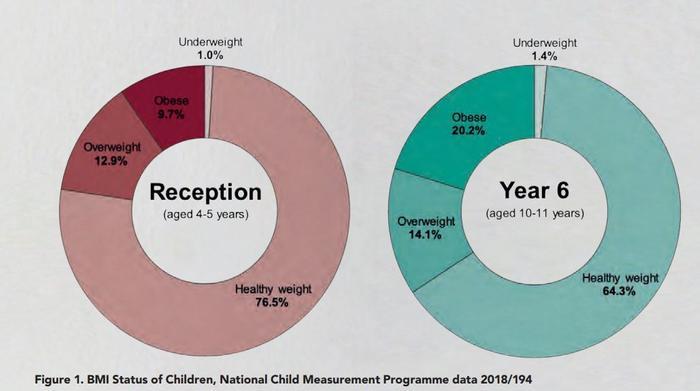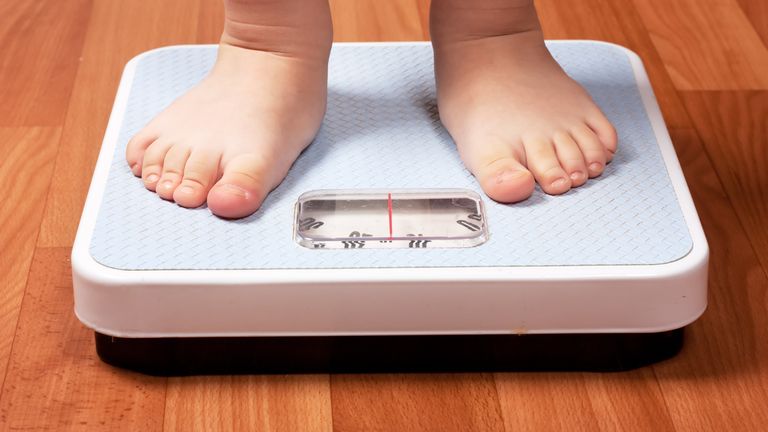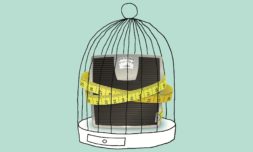Amid concerns over a pandemic-induced rise in child obesity, the UK government announced it would be implementing a variety of measures to tackle the problem.
According to the UK’s Department of Health and Social Care, tackling obesity is one of the greatest challenges the country currently faces.
On an upward trajectory since the 90s, today’s reality paints a deeply troubling picture with around 63% of the entire adult population reported as being over a healthy weight.
Adding insult to injury, one in three children are now leaving primary school overweight, making the UK Europe’s child obesity capital.

Unfortunately, the pandemic has only compounded the issue.
During a nationwide lockdown that’s so far lasted well over a year, home-schooling has become commonplace and, with it, less regular exercise, the absence of a routine, and easier access to an unhealthy diet. This, unsurprisingly, has brought already concerning figures into sharper relief.
‘In years to come, the virus will be gone, we’ll have control of it, but obesity, that’s what’s going to be prolonged,’ warns consultant paediatrician Dr Naomi Simmons.
‘I fear that Covid will contribute to an exacerbation of what’s already a really significant problem.’

Facing a rare window of opportunity to nip this in the bud before it escalates upon our official return to ‘normal life,’ the government has been quick to announce a variety of measures it’s seeking to implement over the coming months as part of its obesity strategy.
While some have been welcomed with open arms – namely a pre-9pm ban on junk food TV advertisements and the development of an app that trains the brain to ditch bad habits – one in particular has been met with sheer disapproval from the general public.
In a move that seems to disregard the equally alarming youth mental health crisis experts argue should be treated as seriously as containing the outbreak, MPs voted to reintroduce the National Child Measurement Programme (NCMP) after it was halted in 2020.
This means pupils aged four to eleven are to be weighed ‘regularly’ from September. Critics calling for the ‘arbitrary’ decision to be scrapped say it promotes fat-shaming and disordered eating, which has the potential to wreak havoc in later life.

So, is the strategy harmful or proactive?
Though still in its trial stages, an app that builds upon previous research suggesting cognitive training is an effective method of weight loss may well succeed among young people.
Called Restrain, it’s designed to bias the user’s thoughts and behaviours towards healthy foods and away from unhealthy foods through games.
By focusing on the psychological aspect of obesity in an interactive and non-invasive way, children will be assisted with making better choices without feeling directly targeted.
‘One of the possible advantages of such training is that it doesn’t require much time or effort,’ explains researcher Mark Randle.
‘It attempts to reprogramme a person’s relationship with food, rather than relying on willpower or requiring them to make dramatic changes to their lifestyle.’

Regarding the long-awaited watershed on advertisements pushing products high in fat, sugar, and salt (alongside a total online ban from April 2022), many believe that the proposal represents a progressive step forward.
They cite a wealth of evidence demonstrating a clear link between food advertising and the food children prefer.
‘The content youngsters see can have an impact on the choices they make and the habits they form,’ said public health minister, Jo Churchill.
‘With children spending more time online, it is vital we act to protect them from unhealthy advertising.’
In supporters’ opinion, reducing children’s exposure to this incessant stream of unhealthiness (15 billion ads annually, to be exact) is finally addressing one of the major factors driving the UK’s stubbornly high obesity rates and will hopefully break the cycle.
Today @BorisJohnson has listened to the voices of young people! Youth Board Co-Chair Tasha explains why the announcement of a #9pmwatershed is a huge step in the right direction for the health of young people.#Obesity #BiteBack2030 pic.twitter.com/FROiKCkPDM
— Bite Back (@BiteBack2030) July 27, 2020
Gen Zers Christina Adane and Dev Sharma of Bite Back’s Youth Board are to thank, for the months they spent striving to bring the campaign to fruition.
This isn’t to say that industry lobbyists aren’t fighting back, however.
The News Media Association, which oversees all national and local newspaper publishers, claims the ‘draconian’ measures will ‘harm news media publishers who rely on advertising revenue to fund journalism which keeps us all informed.’
Of course, the wellbeing of these companies is not a top priority and those in favour of the ban – including the Prime Minister himself – say that sending out a signal in the way we treat advertising is entirely right.
‘Let’s get a grip on it,’ he declared. ‘It’s one important part in building a healthier environment where the healthy option is the easy option.’























